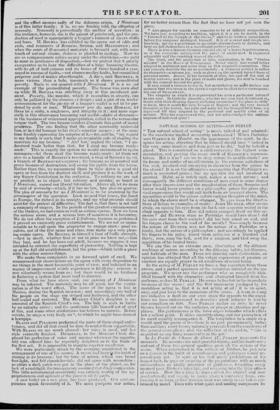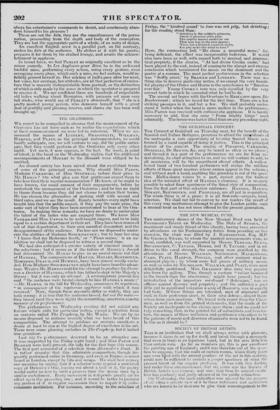NATURAL SCHOOL OF ACTING—AND PERI.ET.
" THE natural school of acting" is much talked of and admired : is the excellence implied accurately understood ? When Partridge Sees GARRICK in Hamlet, on the appearance of the spirit, he de- spises his acting, objecting that he himself should have " looked in the very same -manner, and done just as he did," had he beheld a
ghost. This is considered as a cavil conveying the highest com-
mendation, and proving the exact truth of GARRICK'S represen- tation. But is it so ? are we to deny nature its modiffeetions P are
its forms and modes of manifestation, in the extreme agitations of the soul; identical and unvarying in character from the prince to the clown ? It is on the affirmative assumption that Partridge's re- mark is accounted praise : but we question the fact involved as granted. Habit, as is tritely said, makes a second nature ; and consequently the different conditions of men must in some degree alter their impressions and the manifestation of them. Surprise and terror would never produce on a philosophic prince the gross phy- sical expressions they would call forth from an ignorant clown. The apparition would in the prince agitate various thoughts of the mind.
to which the clown must be a stranger, To I:ass from the illustra- tions of fiction to examples of reality : Jolter HuNTER. after severe
study, on raising his eyes from his book saw a spectre seated in the
chair opposite to him. How did nature comport itself on this oc- easier' ? did HUNTER stare as Partridge would have done ? did his eyes start from their sockets? did his hair stand on end, and his tongue cleave to the roof of his mouth ? No—simply because the nature of HUNTER was not • the nature of a Partridge or a booby, but the nature of a philosopher and accerdingly he applied his fingers to his pulse, found them galloping at. a hunched and thirty, rose, rung the bell, sent for a surgeon, and bled away the.
apparition of his heated brain. • We cite this as an extreme case, illustrative of the different workings of nature, according to the differing, habits, intelligence, and fortitude of the man. From not drawing such distinctions, an opinion has obtained that all the vulgar expressions of passion or emotion are equally proper to all conditions of social being.
In the acting of .M.PERLET we have a fine exception from these errors, and a Perfect: specimen of the natural as founded on the ap- propriate. We never saw the performer who so completely iden- tified himself with the character, and abstracted himself from the audience, as does M. PERLET. He seems to live but in the immediate business of the scene ; and the first impression prodoced by his matchless acting is, that it is not acting at all : it is -so quiet, easy, and just level to the occasions of the scene. A term in sang use indicates a fault on our own stage the opposite to the excel- lence WC have endeavoured to describe: great reliance is laid by our comedians on hits. Now PERLET makes no hits; he never throws himself out on the audience, or ,,grasps at attention and ap- plause. His performance is the teres algae rotundas which offers not a salient point. It slides smoothly along, and our perception of its merit equably accompanies it. The temptation to a single clap would spoil the praise of it—there is no part pre-eminently better than another; every beauty naturally proceeds from the excellence of the general conception ; and the reflection at the end is, " this is as perfect as any thing conceivable in the art." In Le Pantie de Chasse de Henri 11; PERLET represents the monarch. He assumes his mild graceful dignity, and his bonhomie ; and out of these two general • qualities ,grow all the actions of the scene. When entertained in the cotteee of ilichatt, he just acts as a person in the habit of consideration and politeness would un- consciously act. In spite of the half anery prohibitions of Ins honest hest, he goes on assisting at the preparations with as much awkwardness as kindly intention of politeness, forgetting every moment poor Aliehea's interdict, and relapsing into the little offices of service. How like a king he draws about the chairs ! and how good:lett:redly and royally he hauls along a lumbering form, em- bracing it as form of that wooden kind was surely never before em- braced by man I Then with.what quiet and smiling composure he
obeys his entertainer's commands to desist, and courteously aban- dons himself to his pleasure !
These are not the hits, they are the smoothnesses of the perso- nation, proceeding from the depth and body of the conception. They are but the appropriate parts of a whole, of an unity of design. An excellent English actor in a parallel part, on the contrary, makes his hits at the audience. He strikes at it with his points; prepares it for them by his studied lounge, and awaits the acknow- ledgment in applause. In broad farce, we find PERLET as originally excellent as in the minor comedy. In Les Anglaises pour Rire, he is the awkward bashful miss, performing every action, using every gesture, even occupying every place, which such a miss, we feel certain, would in- fallibly present herself in. Her sideling at half a pace after her aunt, her voice, her carriage, her attitudes, are all that perfection of carica- ture that is scarcely distinguishable from portrait, or the distinction of which is only made by the sense in which the spectator is prepared to receive it. We are confident there are hundreds of respectable old ladies walking about Brompton, with parasols set upon very tall sticks, who would say of PERLET'S demoiselle, that " she is a pretty modest young person, who demeans herself with a great deal of gentility and pleasing reserve, and shows she has been well brought up."



















 Previous page
Previous page